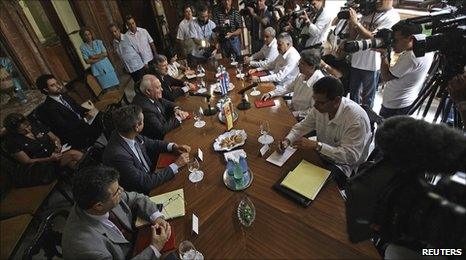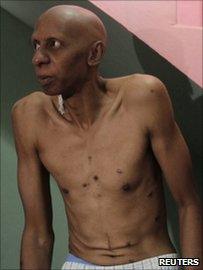Cuba moves to come in from the cold
- Published

Cuba's announcement followed intensive talks with Spanish and Vatican officials
The 52 prisoners who are being freed over the next few months are the last remaining jailed members of the group of 75 opposition figures arrested in a mass government crackdown in 2003.
The Cuban authorities have long denied that they hold political prisoners, calling them mercenaries paid by the United States to undermine the system.
But this mass release is being seen as a major concession to international pressure over human rights, and could have positive ramifications in terms of improved relations with both the US and Europe.
The case of the "75" had long soured the European Union's relations with Cuba.
Initially, the EU imposed sanctions following their arrest, though these were later suspended. At Cuba's insistence they were finally removed in 2009, but only on the condition that there should be an annual review of this one-party state's human rights record.
Spain had hoped to use its presidency of the EU to press for the review to be abandoned, but the death of the jailed dissident hunger striker Orlando Zapata in February made that impossible.
His death brought widespread international condemnation, refocusing attention on Cuba's human rights record and political prisoners. It also emboldened dissident groups inside Cuba.
A second hunger striker, Guillermo Farinas, is currently in a critical condition in hospital on a drip-feed.
Vatican mediation
These prisoner releases will be the largest since 1998, when 101 political prisoners were freed as part of a broader amnesty following the visit of Pope John Paul II.

Guillermo Farinas has been refusing food since February
The Roman Catholic Church has taken on a more active political role in Cuba this year, with the apparent approval of President Raul Castro.
In May, Cardinal Jaime Ortega was able to negotiate an end to a ban on the prisoner's wives' group, the Ladies in White, holding their weekly march.
The government also agreed to transfer political prisoners to jails closer to their families and give better access to medical care for sick inmates.
Spanish Foreign Minister Miguel Angel Moratinos flew to Cuba this week saying that he was going to support the Church's mediation efforts.
On Wednesday, he and Cardinal Ortega held a meeting with President Castro, where they were informed of the prisoner releases. News of the breakthrough was issued by the cardinal's office rather than the government.
Cardinal Ortega was told that five would be freed within hours and allowed to fly to Spain with their families, the remaining 47 released over the next three to four months.
Change of policy
The EU had postponed a final decision on lifting the human rights reviews until September to see if the Catholic Church's mediation would bear fruit.
The Cuban authorities will also be watching with interest what response there will be from Washington.
Relations have improved under President Barack Obama. But the US continues to insist that the decades-old trade embargo can only be lifted after Cuba moves towards greater democracy and human rights.
A bill to end the US travel ban to Cuba could shortly come before Congress.
These prisoner releases can only strengthen the hand of those in the US who are calling for a change of policy.
- Published8 July 2010
- Published19 March 2012
- Published3 July 2010